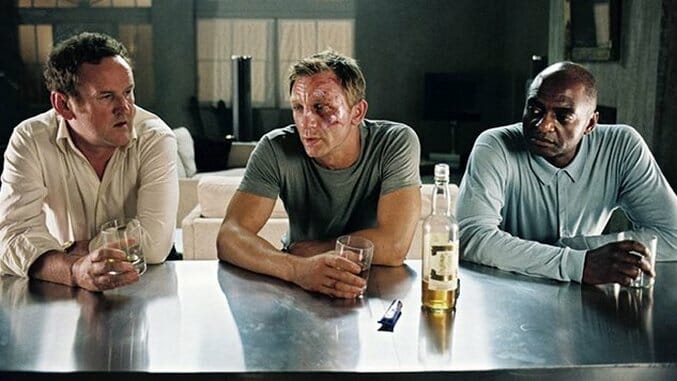Square One: Matthew Vaughn’s Layer Cake (2004)

Whenever a filmmaker of note premieres a new film, it’s a good time to revisit that director’s debut to gauge how far they’ve come as an artist. With Kingsman: The Golden Circle currently in theaters, we take a look back at Matthew Vaughn’s gangster comedy Layer Cake. Note: The following article contains spoilers for both that film and Kingsman: The Secret Service.
“Everyone likes to walk through a door marked ‘private.’”
So narrates Daniel Craig’s unnamed criminal protagonist (designated “XXXX” by IMDb) at the start of the dense and propulsive Layer Cake, the confident debut that launched Matthew Vaughn’s career. Since then, the director has gone on to helm the screen adaptation of Neil Gaiman’s Stardust, the ultraviolent superhero spoof Kick-Ass, X-Men: First Class and the two Kingsman movies. In other words, Vaughn is clearly drawn to the quixotic and the cartoonish, a tendency that Layer Cake doesn’t evince—not at first, anyway. The film’s lineage most obviously incorporates gritty gangland pictures like Goodfellas, whose interest in pulling back the curtain on criminal operations is shared by Layer Cake from its very first scene.
There, a montage takes us through the supply chain of the mobsters for whom XXXX works as a middleman; his superiors include big brass Jimmy (Kenneth Cranham) and a couple lower-level associates, Morty (George Harris) and Gene (Colm Meaney). Craig, in a casual voiceover accompanied by music that wouldn’t feel out of place in a hotel lobby, gives us the rundown via the well-rehearsed, vaguely self-satisfied spiel of a man who knows the ropes and is aware of it. In mood, this introductory segment pulls as much from Soderbergh as it does Scorsese, revealing that, for XXXX and the movie he holds together, the modus operandi is calm, cool and collected. No wonder Craig ended up being tapped for the new Bond.
-

-

-

-

-

-

-

-

-

-

-

-

-

-

-

-

-

-

-

-

-

-

-

-

-

-

-

-

-

-

-

-

-

-

-

-

-

-

-

-








































